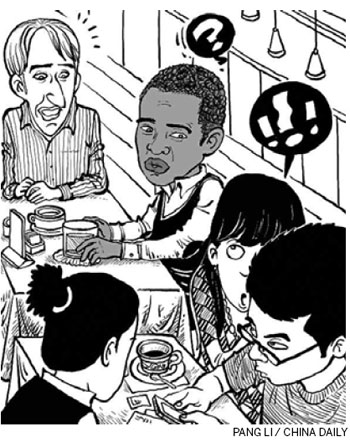A place where questions of race often raise eyebrows
Updated: 2011-11-17 07:57
By Karl Arney (China Daily)
|
|||||||||
For many, the possibilities and generosity seem nearly endless.
 |
Unfortunately, there are some people who are excluded from those possibilities and even the basic decency the rest of us find plentiful. For all of its globalization and progress, China still has a discrimination problem.
As a white American, it took me some time to notice this - I'm highly regarded simply for the way I look, to say nothing of my nationality or education.
The foreign community of Henan provincial capital Zhengzhou was relatively small when I arrived, and the majority of its members were white. Most of the time that I spent with other foreigners was in large groups at the bar, so I had little chance to observe the reactions of random locals to non-whites.
Over time, the community expanded and so did the number of non-whites.
I expected this would help clear away the stereotypes that many natives had, particularly toward blacks. Many of those were stereotypes I hadn't known existed until I saw Chinese students and colleagues react to my black colleagues.
When one new student approached me and referred to my co-worker as coming from Africa, I was a bit surprised. It was a well-spoken young woman, yet she was baffled when I stated that the teacher was American and had never been to Africa.
|
 |
I chalked that up as a fluke until I encountered the same attitude in a teacher.
This was a well-intentioned woman, having volunteered to teach the foreign staff Chinese. Yet as soon as she encountered her black pupil, she told him openly that he could not be an American because she knew he was an African. A protracted debate followed, despite her having just delivered a proud speech about China's own 56 ethnic groups.
Both examples showed a surprising ignorance of global populations, especially given China's adoration of the NBA, which consists largely of black Americans.
It was weeks ago, however, that I was genuinely appalled.
I sat down with a black friend for lunch in a crowded cafeteria next to some young Chinese adults. The girl next to him noticed him sit down and recoiled in horror, grasping her friend's shoulder before they began whispering and shuffled off.
I'm aware that this is all one city in middle China and that such discrimination has largely vanished in larger, more cosmopolitan cities.
Unfortunately, these cities have their own problems, aimed largely at other Asians.
My girlfriend and I had intended to move from Zhengzhou this year and had a number of new cities in mind.
We were not prepared for the resistance we encountered to hiring her outside of Henan simply because she is a Filipina.
It didn't matter that she is more academically qualified for teaching than I am, that schools in the Philippines teach almost entirely in English or that she has experience teaching every age level.
The same schools around the country that urgently wanted to hire me told her that, to quote a school in Chengdu, they only hire "teachers who never have Asian blood".
This discrimination doesn't end with Asians born and raised on the continent.
Talking to a couple of frustrated Chinese-American associates about their attempts to find work in China's more desirable cities showed how seriously many schools take the Chengdu outlook.
The cities where the populaces are better educated and mannered toward non-white foreigners are also the ones where they have the least chance of getting work. Meanwhile, smaller cities hire everyone they can get, including the people they otherwise look down on for simply not being what they expect from a foreigner.
No country is without its biases and misconceptions about people from outside.
China is diversifying at a rapid rate, and I realize that understanding takes time.
I only hope that sufficient time will soon pass so the country can fully embrace its newfound diversity, as the people who contribute to that diversity are already willing to do with China.











